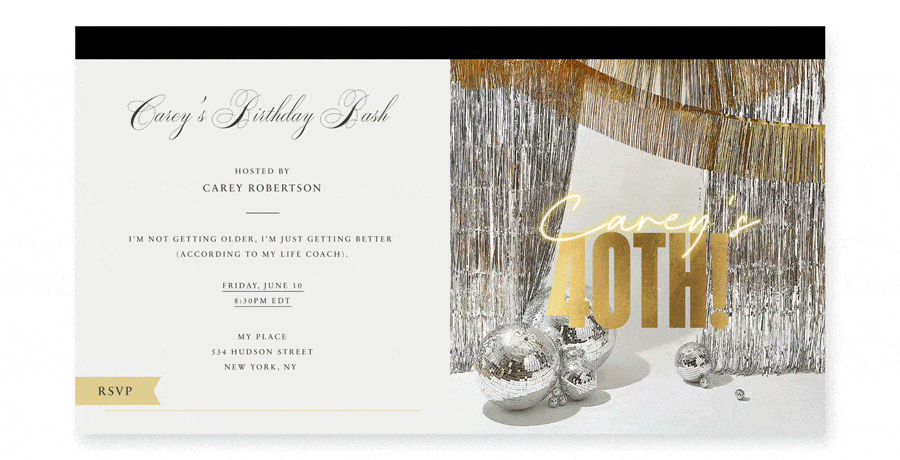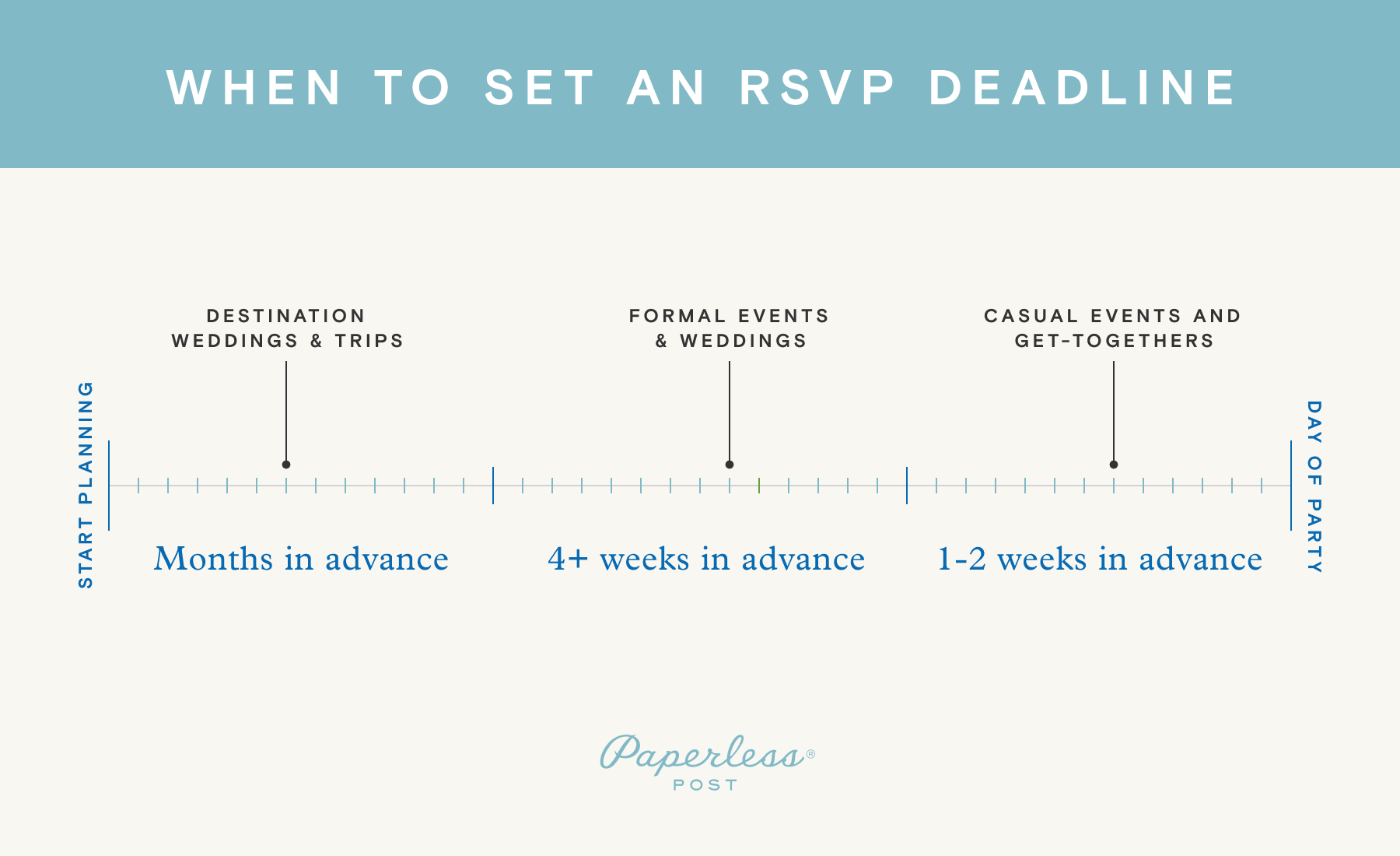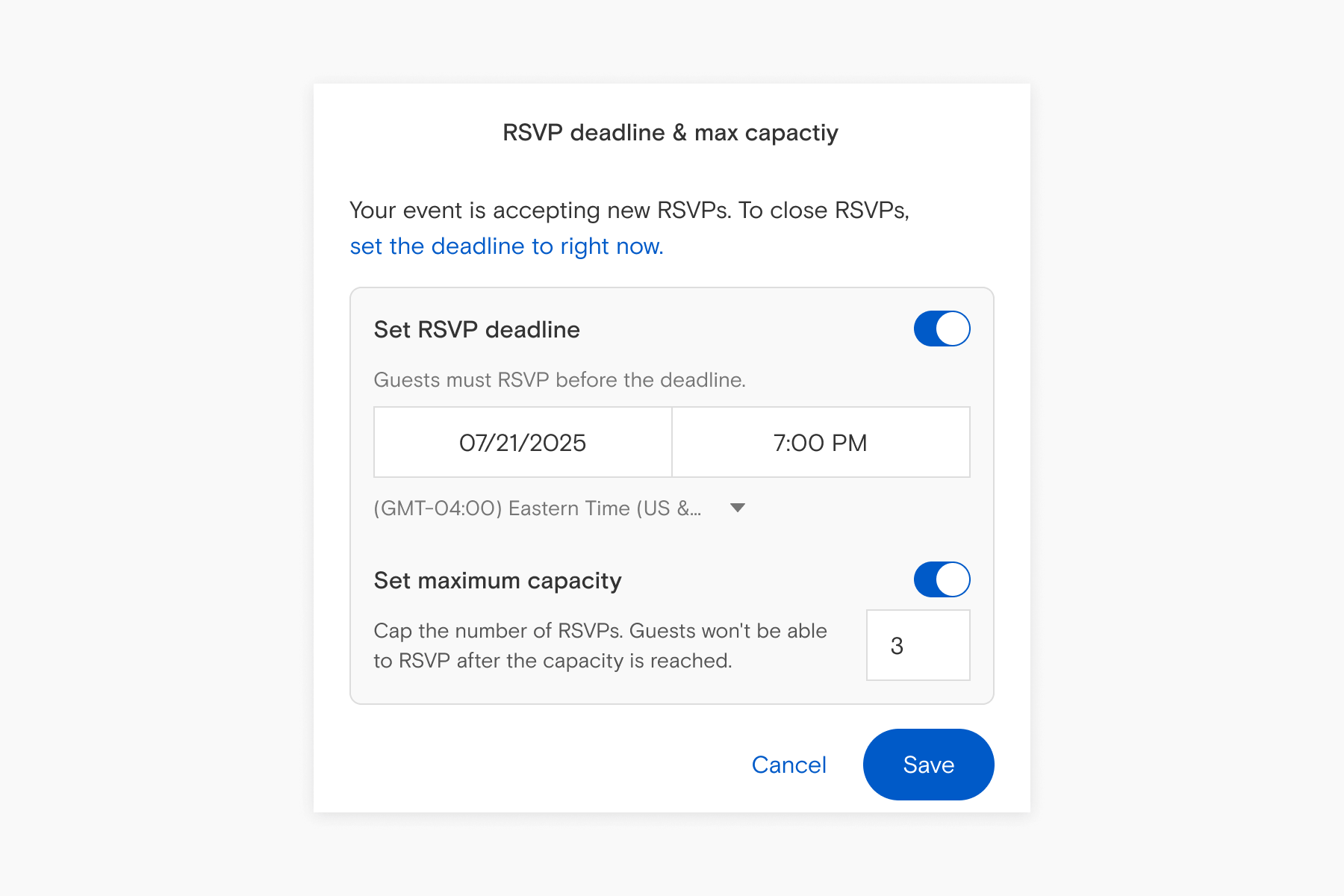What does RSVP mean?

RSVP stands for the French phrase répondez s’il vous plaît, which means “Respond, if you please.” It’s a way for hosts to indicate that they’d like guests to respond to an event invitation stating whether or not they can attend. You’re most likely to see “RSVP” at the end of an invitation, often followed by a date when the host would like your response.
Today, we use the term both as a noun (“to send an RSVP”) and a verb (“to RSVP to an event”). Learn how to reply to an RSVP, the best RSVP etiquette for hosts, and what an “M” in an RSVP means.
Table of Contents
How to reply to an RSVP
The meaning of an RSVP is simple: If an invitation includes the phrase RSVP, the host would like to know whether or not you plan to attend the event. This helps them plan how much food to provide and stay on top of venue capacity or seating arrangements.
What does the ‘M’ in an RSVP mean?
If you see an “M” in your RSVP card with a line after it, it’s asking for a formal reply with your full name and title (which starts with an “M”). Titles may include:
- Mr.
- Miss
- Ms.
- Mrs.
- Mx.
Fill in the rest of your name, as well as the names of anyone else on the invitation. Remember: If they’re not included on the invitation, either by name or by offering you a plus-one, you shouldn’t include them in the RSVP.
Do you always have to RSVP?
Any time you are invited to an event that instructs you to RSVP, whether it’s a formal wedding invitation or a casual birthday party invitation, be sure to respond before the deadline. For printed invitations that include a phone number, you can call or text your RSVP; for Paperless Post invitations, sending an RSVP is as easy as clicking a button.
What if you can’t come to the event?
Sending an RSVP response is a nice gesture to let the host know you’re excited about their upcoming event. But even if you have to RSVP “No,” you should still include a note for the host on your response card or digital reply. Explain why you can’t attend, offer them a healthy dose of “good luck” or “best wishes,” and let them know you look forward to seeing them soon when your schedules allow.
RSVP etiquette for hosts

If you’re the one hosting an upcoming event, there are several steps you can take to make sure your RSVPs come in on time—and that they’re helpful to you. Setting an RSVP deadline, asking your guests questions, and tracking your RSVPs in real-time are just a few ways to streamline your event planning process.
When should you set the deadline for RSVPs?
Utilize our RSVP Deadline feature when sending out your Paperless Post invitations to close the window to respond after a designated date and time of your choosing, and mention the deadline in your event description to ensure everyone is aware. Setting a deadline for RSVPs is crucial for any event that requires a headcount, especially when you’re choosing an RSVP deadline for a wedding. A good rule of thumb is to set your RSVP deadline four weeks before a wedding or formal event where the headcount affects catering and venue availability.
For casual events like backyard barbecues, one to two weeks is fine, especially if you sent your invitations out six weeks before your party. This timeline gives friends and family ample time to look at their social calendars and make a decision on how they’ll RSVP.

What else can guests include with an RSVP?
Anyone who’s hosted an event knows that there can be a few surprises along the way. Whether it’s unexpected extra guests, kids at an adults-only party, or guests who are allergic to the food you serve, every event has a few hiccups—but with Paperless Post’s guest management tools, they’re all preventable.
- Indicate whether guests can bring additional guests before you send out your invitation.
- Enable children vs. adult headcount if you’re allowing children at your event (and include an “Adults Only, please” note in a Details Block if not)
- Ask guests questions about dietary restrictions or preferred dishes, such as “Chicken or Fish,” in a wedding invitation.
What do you do when people don’t RSVP?
Even when you add “RSVP” to your invitation, chances are you’ll still have guests who don’t respond in time—or guests who will be quick to volunteer a “maybe.”
An easy way to handle this is to send a friendly follow-up as the RSVP deadline approaches. If you sent paper invitations, this might be a phone call or text. If you sent your invitation through Paperless Post, send a broadcast message to any guests who’ve yet to respond. A “reminder to RSVP” template is pre-written for you, making it easy to get your headcount ASAP.
RSVP with Paperless Post

Now that you know the definition of an RSVP—and the purpose—keep it in mind the next time you see those four magic letters in your inbox. They may mean répondez s’il vous plaît in French, but they really mean “Please come to my event! I really want you there” in the language of friendship.
Then use Paperless Post’s features and tools to customize and send the perfect invitation, set an RSVP deadline to help with your planning, organize your guest list and message guests individually or as a group, and easily track opens and responses as they come rolling in.
Whatever the occasion, find exclusive designs to suit your style and make planning a breeze.

